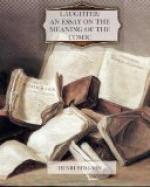Assume, when out for a country walk, that you notice on the top of a hill something that bears a faint resemblance to a large motionless body with revolving arms. So far you do not know what it is, but you begin to search amongst your ideas—that is to say, in the present instance, amongst the recollections at your disposal—for that recollection which will best fit in with what you see. Almost immediately the image of a windmill comes into your mind: the object before you is a windmill. No matter if, before leaving the house, you have just been reading fairy-tales telling of giants with enormous arms; for although common sense consists mainly in being able to remember, it consists even more in being able to forget. Common sense represents the endeavour of a mind continually adapting itself anew and changing ideas when it changes objects. It is the mobility of the intelligence conforming exactly to the mobility of things. It is the moving continuity of our attention to life. But now, let us take Don Quixote setting out for the wars. The romances he has been reading all tell of knights encountering, on the way, giant adversaries. He therefore must needs encounter a giant. This idea of a giant is a privileged recollection which has taken its abode in his mind and lies there in wait, motionless, watching for an opportunity to sally forth and become embodied in a thing. It is bent on entering the material world, and so the very first object he sees bearing the faintest resemblance to a giant is invested with the form of one. Thus Don Quixote sees giants where we see windmills. This is comical; it is also absurd. But is it a mere absurdity,—an absurdity of an indefinite kind?
It is a very special inversion of common sense. It consists in seeking to mould things on an idea of one’s own, instead of moulding one’s ideas on things,—in seeing before us what we are thinking of, instead of thinking of what we see. Good sense would have us leave all our memories in their proper rank and file; then the appropriate memory will every time answer the summons of the situation of the moment and serve only to interpret it. But in Don Quixote, on the contrary, there is one group of memories in command of all the rest and dominating the character itself: thus it is reality that now has to bow to imagination, its only function being to supply fancy with a body. Once the illusion has been created, Don Quixote develops it logically enough in all its consequences; he proceeds with the certainty and precision of a somnambulist who is acting his dream. Such, then, is the origin of his delusions, and such the particular logic which controls this particular absurdity. Now, is this logic peculiar to Don Quixote?




